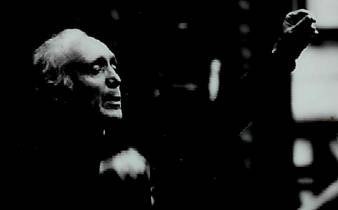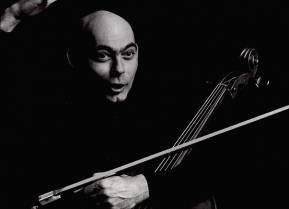
Jascha Horenstein (6 May 1898 - April 2, 1973, in London) Horenstein was born in Kiev, Russian Empire (now Ukraine), into a well-to-do Jewish family; his mother (Marie Ettinger) came from an Austrian rabbinical family and his father (Abraham Horenstein) was Russian. His family moved to Koenigsberg in 1906 and then to Vienna in 1911 and he studied at the Vienna Academy of Music starting in 1916, with Joseph Marx (music theory) and Franz Schreker (composition). In 1920, he moved to Berlin and worked as an assistant to Wilhelm Furtwängler. During the 1920s he conducted the Vienna Symphony Orchestra and the Berlin Philharmonic Orchestra. He became principal conductor of the Düsseldorf Opera in 1928, and then the company's Generalmusikdirektor in 1929. He had to resign his post in March 1933 after the rise of the Nazi Party. His Düsseldorf tenure was the only permanent musical directorship in his career. Forced as a Jew to flee the Nazis, he moved to the United States of America in 1940, and eventually became an American citizen. He taught at the New School for Social Research while in New York City. Horenstein is particularly remembered as a champion of modern music and as a Mahler conductor, although his repertory as shown by discographies was quite wide. In 1929 he conducted the premiere of three movements of Alban Berg's Lyric Suite in an arrangement for string orchestra. In 1950, he conducted the first Paris performance of Berg's Wozzeck. Horenstein conducted the works of Anton Bruckner and Gustav Mahler throughout his career, and he also displayed ongoing interest in Carl Nielsen, whom he knew personally, at a time when these composers were unfashionable. For example, his 1952 Vox recording of Mahler's Symphony No. 9 was the first studio recording, and the second commercial record, of that work. Several years later, he recorded the original version of Bruckner's Symphony No. 9. He made studio recordings of several of Mahler's symphonies at various points in his career, including Symphonies Nos. 1 and 3 with the London Symphony Orchestra. A number of radio archives hold broadcast airchecks of many of the other Mahler symphonies, as well as Das Lied von der Erde. In recent years, several of Horenstein's concert performances have been reissued on the BBC Legends label, including his celebrated 1959 Royal Albert Hall performance of Mahler's Symphony No. 8 and his 1972 Manchester performance of Mahler's Das Lied von der Erde. Horenstein also recorded Robert Simpson's Third Symphony and music by Paul Hindemith and Richard Strauss during the last few years of his life. His opera recordings included Carl Nielsen's Saul og David. His final operatic, and British, engagement was his March 1973 performances at the Royal Opera House, Covent Garden of Richard Wagner's Parsifal. It was during a performance of Nielsen's Fifth Symphony in Minneapolis in 1971 that Horemnstein suffered a heart attack and was caught in mid-air by the leader of the orchestra. Though warned by his doctors to reduce his workload, he continued to conduct. At the time of his death, he was planning to conduct Mahler's Fifth, Sixth and Seventh. 
János Starker (born July 5 1924, Budapest, Kingdom of Hungary)
Starker was born in Budapest to a father of Polish descent and a mother who had immigrated from Ukraine, both Jewish. His two older brothers were violinists, and the young János (named for the hospital in which he was born) was given a cello before his sixth birthday. A child prodigy, Starker made his first public performances at ages six and seven. He entered the Franz Liszt Academy of Music in Budapest to study with Adolf Schiffer and made his debut there at age 11. Starker began teaching other children at age eight, and by the time he was 12 he had five pupils. Starker counts among his strongest influences Leo Weiner, a composer who taught chamber music. Zoltán Kodály, Béla Bartók and Ernő Dohnányi were also members of the Liszt Academy faculty. Starker made his professional debut at age 14 playing the Dvořák concerto with three hours' notice when the originally scheduled soloist was unable to play. He left the Liszt Academy in 1939 and spent most of the war in Budapest. Because of his youth, Starker escaped the tragic fate of his older brothers, who were pressed into forced labor and eventually murdered by the Nazis. Starker nevertheless spent three months in a Nazi internment camp. After the war Starker became principal cellist of the Budapest Opera and the Budapest Philharmonic Orchestras. Starker, who had never been granted Hungarian citizenship, left the Soviet-occupied country in 1946. He gave a successful concert in Vienna, then remained there to prepare for the Geneva Cello Competition, held in October 1946. He lost to his student, Eva Janzer. After observing a horrific concert by the former child prodigy Yehudi Menuhin, Starker had an epiphany. He describes himself as becoming physically ill from the realization that he had little idea how he really played the cello from a technical standpoint. "I played like a blind man", he has said. "What happens to the bird who flies and doesn't know how it flies? That's what happens to child prodigies." Starker spent a year analyzing all aspects of his technique. By October of the following year he had regained his confidence. His studies and exercises he wrote for his friend George Bekefi ultimately resulted in his famous essay and published cello method, "An Organized Method of String Playing". Starker, still in visa limbo, went from Geneva to Paris, where he spent a year. There he made his first recording of Kodaly's monumental solo cello sonata Op. 8, a work which was considered technically unplayable before that time. The recording earned him the Grand Prix du Disque and cemented his fame. Starker emigrated to the United States in 1948 to become principal cellist of the Dallas Symphony Orchestra under Antal Doráti. In 1949 he moved to New York to become principal cellist of the Metropolitan Opera under Fritz Reiner. It was in New York that Starker made the first of his acclaimed recordings of the Bach Cello Suites. Starker's technical mastery led some to suspect, incorrectly, that the recordings were electronically altered; his experiments with microphone placement and recording techniques drew the attention of engineers at the MIT. In 1952, Starker became principal cellist of the Chicago Symphony Orchestra when Fritz Reiner became the music director. In 1958, Starker moved to Indiana University and resumed his solo career, giving hundreds of concerts on every continent. Since 2001, Starker has limited his activities to teaching, master classes and occasional performances with his longtime partner, the pianist Shigeo Neriki, and his son-in-law, daughter and granddaughter, violinists William, Gwen, and Alexandra Preucil. He still actively teaches and views teaching as his responsibility to the next generation of cellists. Former students of Starker's include Tsuyoshi Tsutsumi, Maria Kliegel, Paul Katz, Gary Hoffman, Kathy Kee (formerly of the Atlanta Symphony Orchestra), Laurien Laufman (Former cello professor at the University of Illinois), Chih-Hui Chang, Felix Fan, David Shamban, Anthony Elliott, Jules Eskin, Nella Hunkins (Principal Cellist of the Singapore Symphony Orchestra), Sebastian Toettcher(Hollywood motion picture A-List), Damián Martinez, Pamela Smits, Emilio Colón (cello professor at Indiana University), Dennis Parker (a cellist virtuoso and pedagogue, who has recorded all Popper Etudes on DVD entitled The Popper Manifesto), Mark and Paula Kosower, Regina Mushabac ( also a former Starker teaching assistant), David Premo ( the associate Principal Cellist of the Pittsburgh Symphony Orchestra), Marc Coppey, Alan Harris (Professor of cello at the Eastman School of Music), Rafael Figueroa (the Principal Cellist of the Metropolitan Opera Orchestra), Susan Seligman (the Principal Cellist of the Hudson Valley Philharmonic), Joyce Geeting (soloist and teacher of young pupils at California Lutheran University in Southern California), Lubomir Georgiev (principal cello of the Sacramento Symphony and later professor of cello at Florida State University), Hamilton Cheifetz (Professor of Music at Portland State University and founding member of the Florestan Trio), Marc Johnson (cellist of the Vermeer Quartet), Mihaly Virizlay (late Principal Cellist Emeritus of the Baltimore Symphony Orchestra) and Jakob Ludwig (Second Principal Cellist of La Scala Theatre in Milan).
***************************
Wolfgang Amadeus Mozart Symphony no 39 in E flat major, K 543
Franz Joseph Haydn
Concerto for Cello no 2 in D major, Op. 101 Richard Strauss
Don Quixote, Op. 35 Janos Starker, cello Orchestre National de l'ORTF
Jascha Horenstein
February 24, 1971 (Live)
***************************
Запись из коллекции Миши Горенштейна.
|

